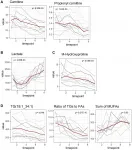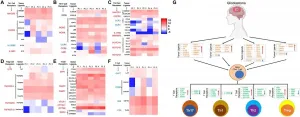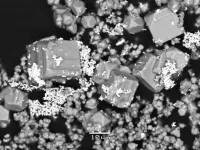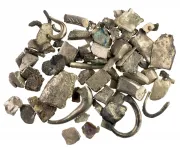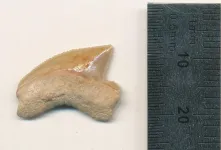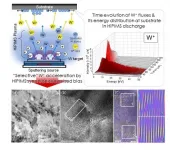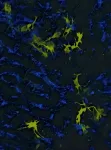(Press-News.org) Oncotarget published "Perioperative changes in the plasma metabolome of patients receiving general anesthesia for pancreatic cancer surgery" which reported that little is known about the impact of anesthesia on the plasma metabolome, although many metabolites have been shown to modulate the function of various immune cells, making it particularly interesting in the context of oncological surgery.
In this study longitudinal dynamics in the plasma metabolome during general anesthesia in patients undergoing pancreatic surgery were analyzed.
Prospective, observational study with 10 patients diagnosed with pancreatic malignancy and subjected to elective resection surgery under general anesthesia.
Plasma metabolites were quantified at eight consecutive perioperative timepoints using mass spectrometry-based targeted metabolomics.
The major finding of this Oncotarget study was perioperative tryptophan depletion and increased taurine synthesis.
The major finding of this Oncotarget study was perioperative tryptophan depletion and increased taurine synthesis.
Dr. Johanna Mock-Ohnesorge from The Heidelberg University Hospital said, "Although general anesthesia using intravenous and volatile anesthetics is well and safely established for extended abdominal surgery, little is known about the effects of anesthesia on perioperative metabolism."
While in the past, anesthetic procedures were considered sole prerequisites of surgery, modern anesthesia evolved to become more individualized in an effort to address a patient's individual needs regarding the metabolic, physiological and immunological integrity in sight of long-term clinical outcome.
Since immune cells as natural killer cells or CD8 T-cells have the capability to identify and eliminate these malignant cells, the perioperative immune status plays an essential role for anti-tumor activities.
A plethora of factors contribute to a complex modulation of immune function during surgery, e.g., the release of damage-associated molecular patterns from injured tissue and the organism's release of metabolites in response to anesthesia and surgical stress.
The objective of this prospective, exploratory study is to gain information on longitudinal perioperative alterations in the plasma metabolome during general anesthesia in patients diagnosed with pancreatic malignancies leading to a better understanding for personalized perioperative management.
The Mock-Ohnesorge Research Team concluded in their Oncotarget Research Output that metabolomics represent a phenotype of all genetic, transcriptomic and posttranslational modifications.
Perioperative metabolomic analysis enables to get a more accurate insight on perioperative processes.
This will answer individual needs enabling personalized anesthetic management.
In the field of surgical oncology, it might be even possible to identify therapeutic windows with best conditions for perioperative immunotherapy or chemotherapy.
Further controlled studies are desperately needed to compare the impact of different anesthetic procedures on the plasma metabolome to identify beneficial or detrimental influences on long-term clinical outcome.
INFORMATION:
DOI - https://doi.org/10.18632/oncotarget.27956
Full text - https://www.oncotarget.com/article/27956/text/
Correspondence to - Johanna Mock-Ohnesorge - johanna.ohnesorge@med.uni-heidelberg.de
Keywords -
metabolomics,
anesthesia,
plasma,
tumor,
longitudinal
About Oncotarget
Oncotarget is a bi-weekly, peer-reviewed, open access biomedical journal covering research on all aspects of oncology.
To learn more about Oncotarget, please visit https://www.oncotarget.com or connect with:
SoundCloud - https://soundcloud.com/oncotarget
Facebook - https://www.facebook.com/Oncotarget/
Twitter - https://twitter.com/oncotarget
LinkedIn - https://www.linkedin.com/company/oncotarget
Pinterest - https://www.pinterest.com/oncotarget/
Reddit - https://www.reddit.com/user/Oncotarget/
Oncotarget is published by Impact Journals, LLC please visit https://www.ImpactJournals.com or connect with @ImpactJrnls
Oncotarget published "Genome wide DNA methylation landscape reveals glioblastoma's influence on epigenetic changes in tumor infiltrating CD4+ T cells" which reported that whole-genome bisulfite sequencing of tumor infiltrating and blood CD4 T-cell from GBM patients showed 13571 differentially methylated regions and a distinct methylation pattern of methylation of tumor infiltrating CD4 T-cells with significant inter-patient variability.
The methylation changes also resulted in transcriptomic changes with 341 differentially expressed genes in CD4 tumor infiltrating T-cells compared to blood.
Analysis of specific genes involved in CD4 differentiation and function revealed differential methylation status of TBX21, GATA3, RORC, FOXP3, IL10 and ...
Inadequate exposure to UVB light from the sun may be associated with an increased risk of colorectal cancer, particularly in older age groups, according to a study using data on 186 countries, published in the open access journal BMC Public Health.
Researchers at the University of California San Diego, USA investigated possible associations between global levels of UVB light in 2017 and rates of colorectal cancer for different countries and age groups in 2018.
The authors found that lower UVB exposure was significantly correlated with higher rates of colorectal cancer across all ...
Why are gold deposits found at all? Gold is famously unreactive, and there seems to be little reason why gold should be concentrated, rather than uniformly scattered throughout the Earth's crust. Now an international group of geochemists have discovered why gold is concentrated alongside arsenic, explaining the formation of most gold deposits. This may also explain why many gold miners and others have been at risk from arsenic poisoning. This work is presented at the Goldschmidt conference, after recent publication*.
Gold has been prized for millennia, for its purity and stability. It's also rare enough to retain its value - the World Gold Council estimates that all the gold ever mined in the world would fit into a 20x20x20-meter cube. It is valued for its beauty, but also because it ...
Scientists have reconstructed the Eastern Mediterranean silver trade, over a period including the traditional dates of the Trojan War, the founding of Rome, and the destruction of Solomon's Temple in Jerusalem. The team of French, Israeli and Australian scientists and numismatists found geochemical evidence for pre-coinage silver trade continuing throughout the Mediterranean during the Late Bronze and Iron Age periods, with the supply slowing only occasionally. Silver was sourced from the whole north-eastern Mediterranean, and as far away as the Iberian ...
Scientists have found an unexplained cache of fossilised shark teeth in an area where there should be none - in a 2900 year old site in the City of David in Jerusalem. This is at least 80 km from where these fossils would be expected to be found. There is no conclusive proof of why the cache was assembled, but it may be that the 80 million-year-old teeth were part of a collection, dating from just after the death of King Solomon*. The same team has now unearthed similar unexplained finds in other parts of ancient Judea.
Presenting the work at the Goldschmidt Conference, lead researcher, Dr. Thomas Tuetken (University of Mainz, Institute of Geosciences) said:
"These fossils are not in their original setting, so they have been moved. They were probably valuable to someone; ...
Tokyo, Japan - Researchers from Tokyo Metropolitan University have used high power impulse magnetron scattering (HiPIMS) to create thin films of tungsten with unprecedentedly low levels of film stress. By optimizing the timing of a "substrate bias pulse" with microsecond precision, they minimized impurities and defects to form crystalline films with stresses as low as 0.03 GPa, similar to those achieved through annealing. Their work promises efficient pathways for creating metallic films for the electronics industry.
Modern electronics relies on the intricate, nanoscale deposition of thin metallic films onto surfaces. This is easier said than done; unless done right, "film stresses" arising from the microscopic internal structure of the film ...
In recent years, immunotherapy has revolutionised the field of cancer treatment. However, inflammatory reactions in healthy tissues frequently trigger side effects that can be serious and lead to the permanent discontinuation of treatment. This toxicity is still poorly understood and is a major obstacle to the use of immunotherapy. Scientists from the University of Geneva (UNIGE), Switzerland, and Harvard Medical School, United States, have succeeded in establishing the differences between deleterious immune reactions and those targeting tumour cells that are sought after. It appears that while the immune mechanisms are similar, the cell ...
It is the membrane of cancer cells that is at the focus of the new research now showing a completely new way in which cancer cells can repair the damage that can otherwise kill them.
In both normal cells and cancer cells, the cell membrane acts as the skin of the cells. And damage to the membrane can be life threatening. The interior of cells is fluid, and if a hole is made in the membrane, the cell simply floats out and dies - a bit like a hole in a water balloon.
Therefore, damage to the cell membrane must be repaired quickly, and now research from a team of Danish researchers shows that cancer cells use a ...
Fast facts:
Nanobodies have been shown to inhibit the dysfunction of key proteins involved with various diseases such as rheumatoid arthritis, osteoarthritis, psoriasis, B-cell lymphoma, and breast cancer
Understanding the structure of a nanobody helps to better understand its disease-fighting potential
Typically, the protein structure is determined from solid samples. Researchers at NYUAD used a liquid state technique to determine protein structure.
Abu Dhabi, UAE: For the first time in the UAE, researchers at NYU Abu Dhabi have used ...
For decades, people have wondered why pelagic red crabs--also called tuna crabs--sometimes wash ashore in the millions on the West Coast of the United States. New research shows that atypical currents, rather than abnormal temperatures, likely bring them up from their home range off Baja California.
Alongside the discovery, the scientists also created a seawater flow index that could help researchers and managers detect abnormal current years.
The new study, published July 1 in Limnology and Oceanography, began after lead author Megan Cimino biked past a pelagic red crab stranding on her way to her office in Monterey ...
